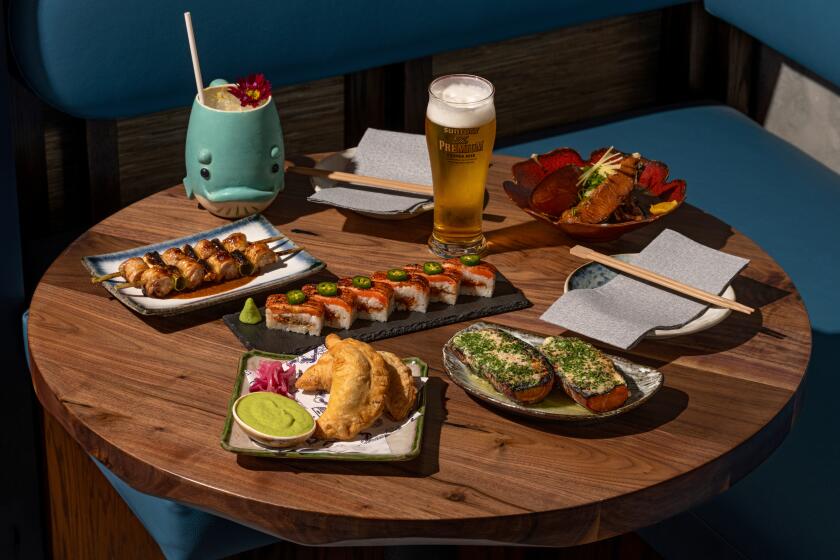Patagonia wants to save the world through beer and buffalo jerky
Beer and buffalo jerky may not be the first tools that come to mind for confronting the environmental crisis. But when you consider that agriculture — from the way we manage soil to the cultivation of livestock — is a major source of carbon emissions and a leading cause of biodiversity degradation, it makes sense that one California company is working to overhaul the food system from the ground up. Beer, buffalo jerky and hot breakfast cereals are just some of the fruits of those labors.
“At the hands of a few mega-corporations with all the power, our global agriculture system is destroying the Earth,” says Yvon Chouinard, the founder and owner of the Ventura-based outdoor apparel company Patagonia, which has long been known for its corporate activism. The company’s growing Patagonia Provisions division, headquartered in Sausalito, is using an expanding selection of organic food items, sourced through regenerative farming and other sustainable practices, to rebuild top soil, repair the food supply chain and safeguard food security.
Its recently released Long Root Ale, made in partnership with Oregon’s certified organic Hopworks Urban Brewery, seeks to get to the literal root of the problem. The beer is made with an innovative perennial grain from the Land Institute in Salina, Kan., a development which is 13 years in the making and just beginning to be used in commercial foods and beverages. The grain, called Kernza, originates from a perennial wheatgrass whose long and dense root systems unfurl like subterranean ZZ Top beards, up to 10 feet beneath the Earth’s surface — hence the name of the beer. Unlike annual wheat crops, Kernza doesn’t need to be tilled and replanted every year, traditional farming practices that over time have resulted in soil erosion and degradation, and loss of carbon to the atmosphere.
Long Root was originally developed because beer was deemed the best vehicle for introducing the commercial market to the benefits of perennial crops, but plans are already in the works for expanding to additional styles of beer made with the Kernza grain or other perennials.
The primary intention remains, however: “If people like it, then maybe the dialogue gets out and potentially influences other beer makers to start incorporating these kinds of alternative crops,” says Patagonia Provisions Senior Director Birgit Cameron. According to her, the more acreage across the country that turns to perennial crops and other regenerative organic practices, the better it is going to be for the planet.
Other offerings in the Provisions lineup include a tangy grass-fed buffalo jerky that’s been sourced from Midwest ranchers who are reintroducing bison to the prairie in an effort to restore the biodiversity of native grasslands. There is also a selection of smoked wild pink salmon fillets, sourced from a Washington fishery that uses a variation of the ancient reef netting method to catch only selective fish, releasing all others unharmed.
Other products include wild sockeye salmon fillets, soups, hot cereal mixes, and fruit and almond bars. This winter the company plans to release a selection of savory grains that are intended to work as substitutes for rice or pasta dishes. In the future, Provisions is also looking to incorporate frozen foods, including frozen buffalo meat from the same supplier that provides its jerky.
The current lineup of food items is entirely shelf stable when unopened, and therefore ideal for the kinds of outdoor ventures that express the ethos of the Patagonia brand. Patagonia Provisions is also pushing to expand the application of its products beyond the camp food market. Much of its website is dedicated to a mix of chef-created recipes and well-styled food photography. A plan for wider grocery distribution seeks to accomplish the dual goals of company growth and consumer awareness about the potential of organic regenerative farming, which Cameron points to as the key to soil health and, in turn, more resilient ecosystems and communities.
At the hands of a few mega-corporations with all the power, our global agriculture system is destroying the Earth,
— Yvon Chouinard, founder of Patagonia
“All roads lead to soil,” Cameron says.
In California, Provisions is working in its own backyard to aid and encourage growers in the Central Valley — who produce, among other produce, the almonds, apricots and carrots for its fruit and nut bars and soups — to incorporate regenerative practices into their organic farming. The company contends that these methods are especially important for addressing our state’s critical water issues, because they will increase water retention through drought-resistant soil.
“The goal is that the farmers we work with, and others, will adopt these practices,” says Cameron, who acknowledges that there is only so much that Patagonia Provisions can do on its own to affect large scale, lasting change. Its success will need to serve as evidence to the agriculture industry as a whole that the farming and cultivating practices it is championing are environmentally sustainable and sustainable for business.
Chouinard is clear-eyed about the task: “We need to show that regenerative organics, which rebuild the soil and remove carbon from the atmosphere, can scale up and become a serious source of food and fiber.”
The founder of Patagonia has referred to his company’s expansion into food both his greatest experiment and an act of revolution, the latter of which, he has said, always starts from the bottom. If that’s true, then the efforts of his company — along with those of the many small farmers, fisheries, ranchers and researchers with whom they are partnering to overhaul the food system one acre at a time — are grass roots in every sense of the word.
ALSO
The chef of a Michelin-starred restaurant opened a food truck in Los Angeles
Plenty of beer and duck fat pretzel balls at the new Karl Strauss brewpub in downtown L.A.
How the California Grain Campaign is working to get local whole grain bread to your table
More to Read
Eat your way across L.A.
Get our weekly Tasting Notes newsletter for reviews, news and more.
You may occasionally receive promotional content from the Los Angeles Times.






